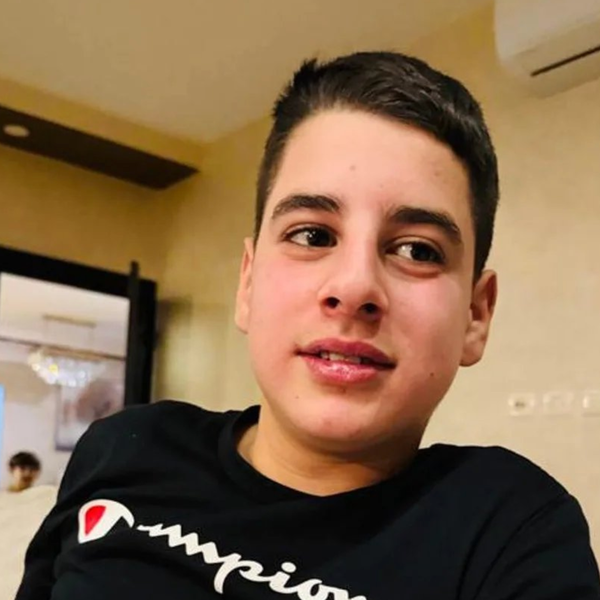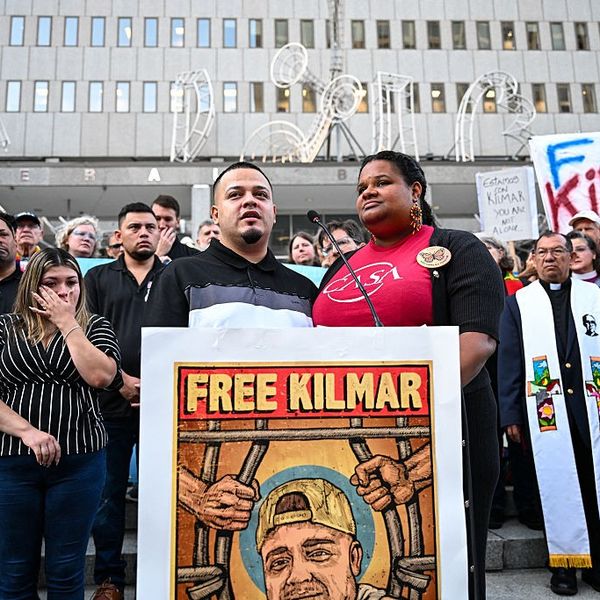Abducted, Tortured, Held 14 Years Without Trial, 'Gitmo Diary' Author Finally Free
Transferred to his native Mauritania, Mohamedou Ould Slahi is 'thrilled' to reunite his family
Mohamedou Ould Slahi, who documented his torture and imprisonment in the 2015 Guantanamo Diary, on Monday was finally returned home to his native Mauritania.
Upon his release, Slahi said, "I feel grateful and indebted to the people who have stood by me. I have come to learn that goodness is transnational, transcultural, and trans-ethnic. I'm thrilled to reunite with my family."
One of Guantanamo's longest-held detainees, Slahi's transfer comes 14 years after he was first brought to the offshore U.S. military prison, where he was held without charge or trial. In his critically-acclaimed memoir, the 44-year-old electrical engineer recounted his "endless world tour" of CIA black sites in Jordan, Afghanistan, and eventually Cuba, where he was abused and tortured.
Slahi's "odyssey...began in 2001 when, at the behest of the U.S. government, Mauritanian authorities detained Slahi after he voluntarily went in for questioning," the American Civil Liberties Union (ACLU) noted on Monday.
In a column, Hina Shamsi, one of Slahi's attorneys and director of the ACLU's National Security Project, detailed some of his ordeal:
Mohamedou was one of two so-called "Special Projects" whose cruel treatment Rumsfeld personally approved. The abuse he suffered included beatings, extreme isolation, sleep deprivation, frigid rooms, shackling in stress positions, and threats against both Mohamedou and his mother, to whom he was very close. Mohamedou's mother died in 2012, without ever seeing her son again.
In 2010, a federal district court judge determined Mohamedou's detention was unlawful and ordered him released. The U.S. government successfully appealed that decision, and the habeas case is still pending.
Looking forward, Shamsi said, "All of us on Mohamedou's team are focused on ensuring he has a cushion of love, support, counseling, and space to adjust after 14 long years in which he was denied his human rights. We already know how resilient Mohamedou is." She further noted he now plans to "write and work, establish a charity, and care for his family."
The military's Periodic Review Board cleared Slahi for release in July of this year. Among the evidence submitted in his favor was a letter of support by a former U.S. military guard who was assigned to Slahi for 10 months at at Guantanamo.
"We are overjoyed for Mohamedou and his family, and his release brings the U.S. one man closer to ending the travesty that is Guantanamo," Shamsi added in a press statement. "Dozens of other men still remain trapped in Guantanamo. With time running out, President Obama must double down and not just close the prison, but end the unlawful practice of indefinite detention that it represents."
In fact, 60 prisoners remain in Guantanamo, 19 of whom have been cleared for release.
An Urgent Message From Our Co-Founder
Dear Common Dreams reader, The U.S. is on a fast track to authoritarianism like nothing I've ever seen. Meanwhile, corporate news outlets are utterly capitulating to Trump, twisting their coverage to avoid drawing his ire while lining up to stuff cash in his pockets. That's why I believe that Common Dreams is doing the best and most consequential reporting that we've ever done. Our small but mighty team is a progressive reporting powerhouse, covering the news every day that the corporate media never will. Our mission has always been simple: To inform. To inspire. And to ignite change for the common good. Now here's the key piece that I want all our readers to understand: None of this would be possible without your financial support. That's not just some fundraising cliche. It's the absolute and literal truth. We don't accept corporate advertising and never will. We don't have a paywall because we don't think people should be blocked from critical news based on their ability to pay. Everything we do is funded by the donations of readers like you. Will you donate now to help power the nonprofit, independent reporting of Common Dreams? Thank you for being a vital member of our community. Together, we can keep independent journalism alive when it’s needed most. - Craig Brown, Co-founder |
Mohamedou Ould Slahi, who documented his torture and imprisonment in the 2015 Guantanamo Diary, on Monday was finally returned home to his native Mauritania.
Upon his release, Slahi said, "I feel grateful and indebted to the people who have stood by me. I have come to learn that goodness is transnational, transcultural, and trans-ethnic. I'm thrilled to reunite with my family."
One of Guantanamo's longest-held detainees, Slahi's transfer comes 14 years after he was first brought to the offshore U.S. military prison, where he was held without charge or trial. In his critically-acclaimed memoir, the 44-year-old electrical engineer recounted his "endless world tour" of CIA black sites in Jordan, Afghanistan, and eventually Cuba, where he was abused and tortured.
Slahi's "odyssey...began in 2001 when, at the behest of the U.S. government, Mauritanian authorities detained Slahi after he voluntarily went in for questioning," the American Civil Liberties Union (ACLU) noted on Monday.
In a column, Hina Shamsi, one of Slahi's attorneys and director of the ACLU's National Security Project, detailed some of his ordeal:
Mohamedou was one of two so-called "Special Projects" whose cruel treatment Rumsfeld personally approved. The abuse he suffered included beatings, extreme isolation, sleep deprivation, frigid rooms, shackling in stress positions, and threats against both Mohamedou and his mother, to whom he was very close. Mohamedou's mother died in 2012, without ever seeing her son again.
In 2010, a federal district court judge determined Mohamedou's detention was unlawful and ordered him released. The U.S. government successfully appealed that decision, and the habeas case is still pending.
Looking forward, Shamsi said, "All of us on Mohamedou's team are focused on ensuring he has a cushion of love, support, counseling, and space to adjust after 14 long years in which he was denied his human rights. We already know how resilient Mohamedou is." She further noted he now plans to "write and work, establish a charity, and care for his family."
The military's Periodic Review Board cleared Slahi for release in July of this year. Among the evidence submitted in his favor was a letter of support by a former U.S. military guard who was assigned to Slahi for 10 months at at Guantanamo.
"We are overjoyed for Mohamedou and his family, and his release brings the U.S. one man closer to ending the travesty that is Guantanamo," Shamsi added in a press statement. "Dozens of other men still remain trapped in Guantanamo. With time running out, President Obama must double down and not just close the prison, but end the unlawful practice of indefinite detention that it represents."
In fact, 60 prisoners remain in Guantanamo, 19 of whom have been cleared for release.
Mohamedou Ould Slahi, who documented his torture and imprisonment in the 2015 Guantanamo Diary, on Monday was finally returned home to his native Mauritania.
Upon his release, Slahi said, "I feel grateful and indebted to the people who have stood by me. I have come to learn that goodness is transnational, transcultural, and trans-ethnic. I'm thrilled to reunite with my family."
One of Guantanamo's longest-held detainees, Slahi's transfer comes 14 years after he was first brought to the offshore U.S. military prison, where he was held without charge or trial. In his critically-acclaimed memoir, the 44-year-old electrical engineer recounted his "endless world tour" of CIA black sites in Jordan, Afghanistan, and eventually Cuba, where he was abused and tortured.
Slahi's "odyssey...began in 2001 when, at the behest of the U.S. government, Mauritanian authorities detained Slahi after he voluntarily went in for questioning," the American Civil Liberties Union (ACLU) noted on Monday.
In a column, Hina Shamsi, one of Slahi's attorneys and director of the ACLU's National Security Project, detailed some of his ordeal:
Mohamedou was one of two so-called "Special Projects" whose cruel treatment Rumsfeld personally approved. The abuse he suffered included beatings, extreme isolation, sleep deprivation, frigid rooms, shackling in stress positions, and threats against both Mohamedou and his mother, to whom he was very close. Mohamedou's mother died in 2012, without ever seeing her son again.
In 2010, a federal district court judge determined Mohamedou's detention was unlawful and ordered him released. The U.S. government successfully appealed that decision, and the habeas case is still pending.
Looking forward, Shamsi said, "All of us on Mohamedou's team are focused on ensuring he has a cushion of love, support, counseling, and space to adjust after 14 long years in which he was denied his human rights. We already know how resilient Mohamedou is." She further noted he now plans to "write and work, establish a charity, and care for his family."
The military's Periodic Review Board cleared Slahi for release in July of this year. Among the evidence submitted in his favor was a letter of support by a former U.S. military guard who was assigned to Slahi for 10 months at at Guantanamo.
"We are overjoyed for Mohamedou and his family, and his release brings the U.S. one man closer to ending the travesty that is Guantanamo," Shamsi added in a press statement. "Dozens of other men still remain trapped in Guantanamo. With time running out, President Obama must double down and not just close the prison, but end the unlawful practice of indefinite detention that it represents."
In fact, 60 prisoners remain in Guantanamo, 19 of whom have been cleared for release.

